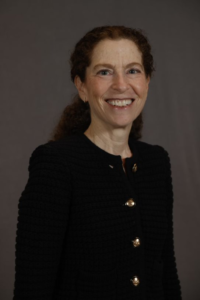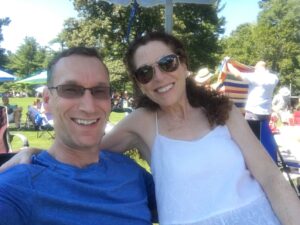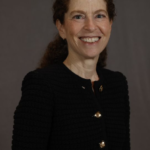During ACR Convergence 2023 in San Diego, Liana Fraenkel, MD, MPH, assumed the presidency of the Rheumatology Research Foundation. For the past two years, Dr. Fraenkel has served as the Foundation’s vice president. She is also an adjunct professor of medicine at Yale School of Medicine, New Haven, Conn., and the director of medical education and patient-centered population health research at Berkshire Health Systems in rural western Massachusetts.
The Foundation was established in 1985 as the ACR Research & Education Foundation. Since its inception, the Foundation has become the largest private funding source of rheumatology research and training programs in the U.S. and has consistently garnered a four-star Charity Navigator rating for its adherence to transparency. The Foundation has awarded more than 135 grants for new education, training, career development and research this fiscal cycle and is committing $13 million to fund its current class of award recipients.

Dr. Fraenkel
Dr. Fraenkel is eager to grow the Foundation’s portfolio and to advance its mission and strategic plan during her tenure. During a recent conversation, her enthusiasm for the Foundation’s work was infectious.
The Rheumatologist (TR): You mentioned in a recent TR article that you would not have had your career without the support of the Foundation. Could you elaborate about those specifics?
Dr. Fraenkel: Although I’m known for being positive and idealistic, that [statement] is 100% true and not an exaggeration. I can remember in detail how I felt about this and why. When I was starting my career, I was really interested in a niche category that wasn’t well acknowledged in clinical research at our typical [National Institutes of Health] NIH-funded institutes. I was intrigued about why patients make the decisions they do. For example, I saw that patients with lupus were refusing immunosuppressive therapy that could potentially save their kidneys. I became very interested in medical decision making, which was not something typically funded in the rheumatology community. When I started doing work in this area and applied to the Foundation [for funding], it was critical at that point in my career that [my work] could be funded. This initial funding allowed me to develop expertise in this area that then enabled me to go on and get future funding and have a career as a researcher. In fact, I still have funding from the Foundation.
TR: So this type of funding was helpful to you. How can that be advantageous for others?
Dr. Fraenkel: Yes, this was critical for my career. I continue to be passionate about this not only because I experienced it myself, but I think all junior faculty feel this way. As an investigator dependent on grant funding, you are worried about whether or not you can succeed. That is stressful on multiple levels: on an academic level (Are you going to be able to do this?) and on a financial level (Can you secure funding?) At that time in my career, I was seeing people who I admired and respected apply to the NIH, get phenomenally good scores and then not receive funding. That is very discouraging. I also remember feeling, with the Foundation, that if I do my job right and write a good grant, there’s a really good chance I’m going to get funded. That was critical to being willing to pursue this path.
TR: During the past year, the Foundation delineated its strategic plan, focusing on three major areas: building the workforce, fostering innovation and collaboration, and leveraging relationships. Is there one of these areas that is especially close to your own heart?
Dr. Fraenkel: I would say the two major aims—to train rheumatologists so our patients have a doctor to go to, and to make sure we’re supporting research so the doctors they’re going to have the best possible solutions for them. I am also very interested in increasing awareness of the Foundation, which will lead to supporting most of the strategic plan goals.
It’s unclear to me why we don’t have one thousand percent support by all our members. To me, it’s a slam dunk: If you know the Foundation and their values and their mission, why would you not be supporting them? We are working hard to better disseminate the wonderful work the Foundation is doing.
TR: What do you see as the near-term and future obstacles for growing the workforce and increasing research, and how is the Foundation addressing these?
Dr. Fraenkel: Clearly, access to enough physicians is a big deal. The Foundation and the ACR are working together on improving the pipeline and thinking outside of the box to ensure that our patients have access to rheumatology professionals. For example, just last year we had a [Notice of Special Interest] on telemedicine, which can lead to a new pathway of care delivery.
We also need to make sure that we remain at the forefront of discovery. The Foundation is very focused on our research portfolio, which continues to grow. This brings up the other thing that I love about the Foundation: It’s flexible. We’re constantly taking the pulse of what needs to be done now. It’s a foundation that listens and acts and is responsive to the community.
The other issue is access to money. It is a strong goal of mine to raise absolutely as much money as feasibly possible over the next couple of years. Basically, the more money we raise, the more fellows we can support, the more medical students we can bring to ACR Convergence, the more active outreach we can do to ensure diversity among the doctors and researchers we’re training to take care of our patients. In short, the more money we raise, the more we can do. We can have a big impact, so every donor makes a huge difference. And we need to keep innovating, and to do that we need to make sure we grow our donor pool.

Dr. Fraenkel enjoys a Boston Symphony Orchestra summer concert at Tanglewood with her husband, David Oelberg, MD, a pulmonologist with Berkshire Health Systems.
TR: You’ve said that you’re a very positive person. Is there something else you would like our ACR/ARP members to know about you?
Dr. Fraenkel: My second favorite thing after volunteering for the Foundation is having people visit us in the Berkshires. We have four paddleboards and two kayaks in the garage. And after an active day, life doesn’t get better than sitting on a beautiful expansive lawn and listening to the Boston Symphony Orchestra (wine is allowed!). We welcome the chance to take people around and show off the beautiful area we live in!
Gretchen Henkel is a health and medical journalist based in California.



